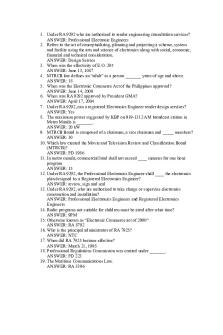ECE discussion 11 PDF

| Title | ECE discussion 11 |
|---|---|
| Course | Foundations of Early Childhood Education |
| Institution | Langara College |
| Pages | 2 |
| File Size | 93.5 KB |
| File Type | |
| Total Downloads | 19 |
| Total Views | 134 |
Summary
ECE discussion 11...
Description
GROUP DISCUSSION WEEK 10
The supervisor in this case has failed to meet the responsibilities as a supervisor as her decision to not report has negatively affected the child’s health and safety. According to Grenier & Leduc (2020), “Child Welfare laws in Canada require that all cases of suspected child abuse or neglect be reported to appropriate child welfare authorities,” (p. 357). The supervisor went against the Child Welfare law and therefore has uphold her ethical and professional responsibilities. What would you have done if Sam had come to you with the same concerns? Which resources would you guide her to? If we were the supervisor and were approached by Sam’s concerns, we would immediately work alongside her and figure out a plan that would support the family. Our first step would be to provide a safe and comfortable space for Miriam to share her concerns and worry, if she is willing to. If she has shared details about her situation we would write it in our record, this includes the time, place, the exact words, and a detailed description of what has occurred. After gathering all our information we will call the Child Welfare, so they can further investigate this situation. Some of the resources we would provide her with is contact information for Licensing Officers, the ECEBC website about “Let’s Talk About Touching”, and The B.C Handbook for Action on Child Abuse and Neglect. 3) How would the ELF and the ECEBC Code of Ethics support Sam in managing this situation? Which principles would you review to support you in this situation? The Early Learning Framework and the ECEBC Code of Ethics would give Sam the guidance he needs for this particular situation. One of the principles in the ECEBC Code of Ethics states that, “early childhood educators demonstrate caring for children in all aspects of their practice,” (Early Childhood Educator of British Columbia, 2008, p. 7). In other words, it is of the utmost importance for educators to provide emotional support and care in multiple ways; whether it be through expressing appropriate affection to children or responding to child’s expressions of need. If Sam decided to report this situation, then she would be following the ECEBC Code of Ethics. This decision to report is an act of caring, supporting and protecting the child. Another principle from the ECEC Code of Ethics that would support Sam is the principle that states that “Early childhood educators work in partnership with colleagues and other service providers to support the well-being of families,” (Early Childhood Educator of British Columbia, 2008, p. 9). Additionally, the concept of the pedagogy of listening from the Early Learning Framework would help support Sam as well. According to The Early Learning Framework (2019) to “
[listen] to the thousand languages, symbols and codes we use to express ourselves and communicate,” (p. 47). By actively listening and attuning to the many ways that children may communicate with us, we can be able to interpret what the child is saying to us and be able to take initiative in the event that a child is being abused or neglected.
References Early Childhood Educator of British Columbia (2008). Code of Ethics: Early childhood educator of British Columbia. Vancouver, BC: ECEBC. Government of British Columbia (2019). British Columbia early learning framework. Victoria, BC: Ministry of Education, Ministry of Health, Ministry of Children and Family Development, & British Columbia Grenier, D., & Leduc, D. (2020). Well beings: A guide to health in child care. Ottawa, Ontario: Canadian Paediatric Society. The B.C. Handbook for Action on Child Abuse and Neglect. (2017). Ministry of Children and Family Development. The Early Learning Framework. (2019). British Columbia: Early Learning Framework. Victoria, B.C.: Ministry of Education. Welch, G., Wilhelm, L., & Johnson, H. (2016). Identifying and Responding to Child Neglect in Parental and Group Care. Exchange, 44–47....
Similar Free PDFs

ECE discussion 11
- 2 Pages

ECE discussion 4
- 2 Pages

ECE discussion 7
- 2 Pages

Discussion 11
- 5 Pages

Ece vccs ece scheal
- 3 Pages

ECE 207 Week 5 Discussion 1
- 1 Pages

Unit 11 Discussion - Notes
- 1 Pages

Week 11 Discussion
- 3 Pages

ECE-Algo Fall2021 HW2
- 1 Pages

Questions in ECE Laws
- 6 Pages

ECE-120-History Tabletemplate
- 3 Pages

ECE 20002 Syllabus
- 5 Pages

ALL ECE Theories
- 5 Pages

Ece equipment handbook
- 26 Pages

Gate ece 2022 syllabus
- 3 Pages
Popular Institutions
- Tinajero National High School - Annex
- Politeknik Caltex Riau
- Yokohama City University
- SGT University
- University of Al-Qadisiyah
- Divine Word College of Vigan
- Techniek College Rotterdam
- Universidade de Santiago
- Universiti Teknologi MARA Cawangan Johor Kampus Pasir Gudang
- Poltekkes Kemenkes Yogyakarta
- Baguio City National High School
- Colegio san marcos
- preparatoria uno
- Centro de Bachillerato Tecnológico Industrial y de Servicios No. 107
- Dalian Maritime University
- Quang Trung Secondary School
- Colegio Tecnológico en Informática
- Corporación Regional de Educación Superior
- Grupo CEDVA
- Dar Al Uloom University
- Centro de Estudios Preuniversitarios de la Universidad Nacional de Ingeniería
- 上智大学
- Aakash International School, Nuna Majara
- San Felipe Neri Catholic School
- Kang Chiao International School - New Taipei City
- Misamis Occidental National High School
- Institución Educativa Escuela Normal Juan Ladrilleros
- Kolehiyo ng Pantukan
- Batanes State College
- Instituto Continental
- Sekolah Menengah Kejuruan Kesehatan Kaltara (Tarakan)
- Colegio de La Inmaculada Concepcion - Cebu
